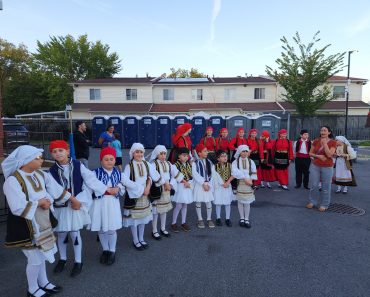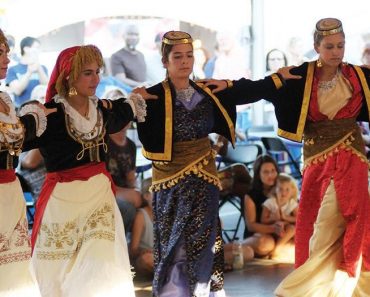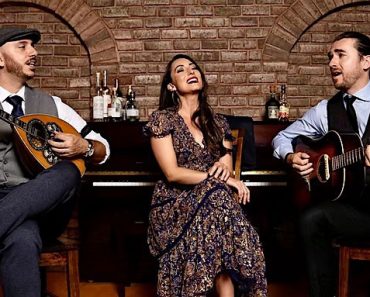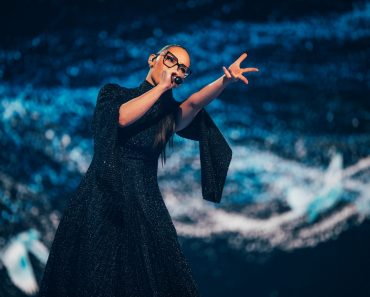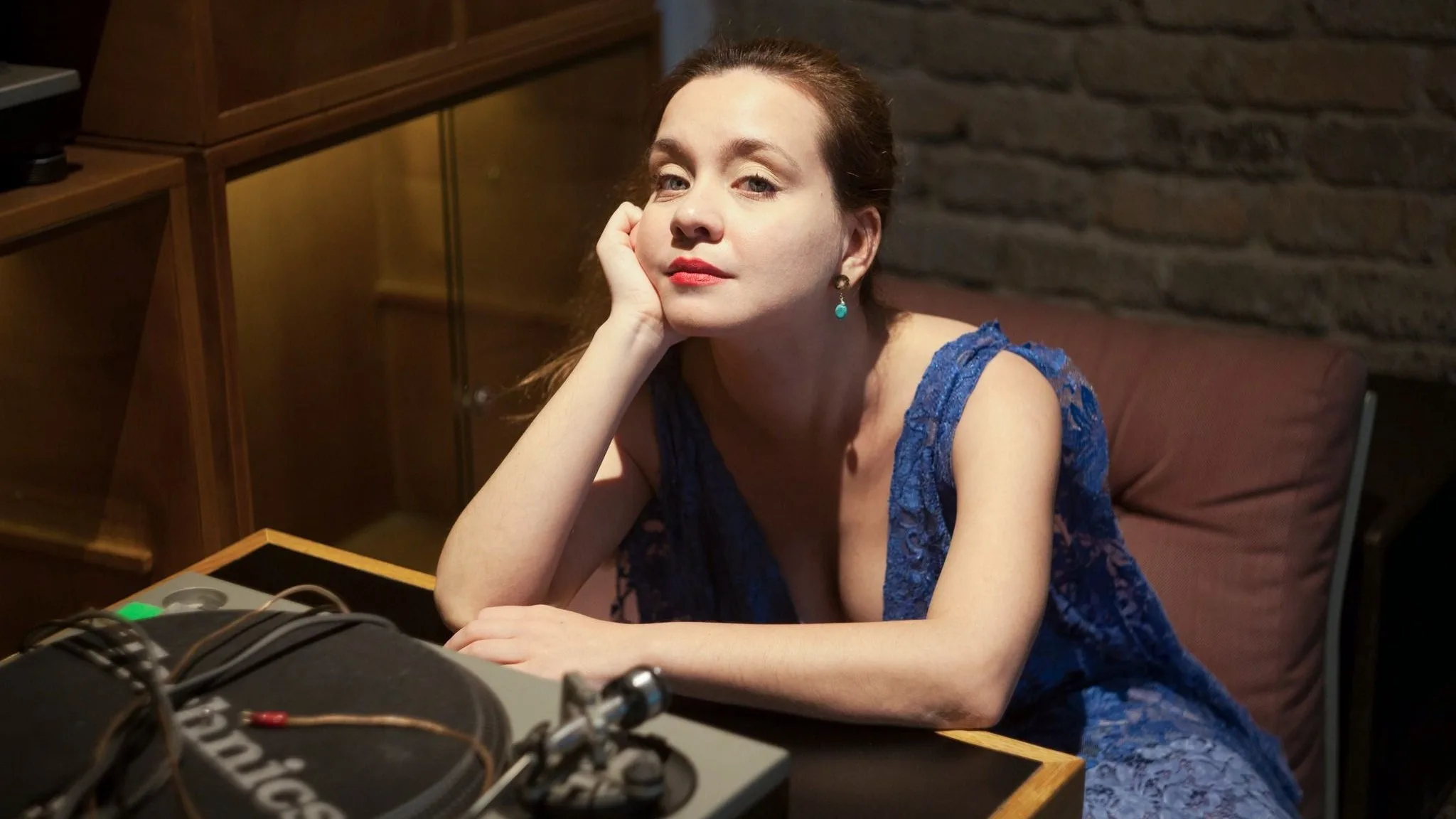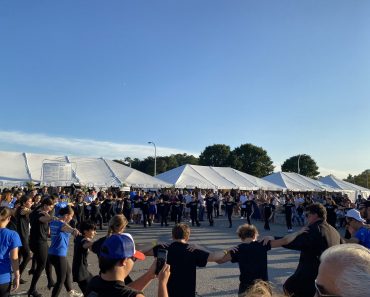Humour released their debut album Learning Greek via SO Young Records on the 8th of August and followed it up with a run of instores. The five-piece have received critical acclaim for the follow-up to their two EPs and ahead of their support slot opening for Been Stellar at The Art School in Glasgow, God In The TV Zine spoke to Andreas Christodoulidis (vocals) and Jack Lyall (guitar). Andreas decided to learn Greek in order to help make the connections with his heritage, and it’s the thread that runs through the album.
How were the In Stores? In Edinburgh it was interesting to hear you say that there were songs that you hadn’t worked out how to play live as the full band, but you could do in an acoustic set!
Andreas: They were really good. It was nice playing a stripped back set, which was a bit of a challenge. I think at the moment with the whole band they’re kind of missing something. I think we just layered them so much.
Jack: They’re the more melodic ones. I think when we play them live they don’t sound really heavy, and so we shy away..
Andreas: Which wasn’t an issue when we paired it back to just the chords and the melody….. but we will get there!
Humour came together during lockdown and you producd the two EPs 2022 debut pure misery and 2023’s A Small Crowd Gathered To Watch Me. Obviously the next step was an album, and I wonder if learning Greek was always going to be the crux of the album, or was that just how it panned out?
Andreas: It was just how it panned out. Most of the album was written and we recorded it in one form fully but weren’t happy with it. There was a whole version of it that we recorded, but we decided it just wasn’t quite right. We decided to go back to the studio and write more. I think all of the singles, apart from ‘Neighbours’, were in that second batch of songs, so it ended up being a really good thing.
I think it was around that time that we had one half finished song that wasn’t very good, and there was this line about learning Greek in it. And we really liked that as a title, and we thought maybe that could just be the title of the album, even if there isn’t a song on it called “Learning Greek“. And then I started to think about how lots of the songs were about nostalgia, thinking about the past and childhood and references from the past, and a lot of that is Greek, because of my parents. And then with the actual song, Jack had this instrumental, less than a minute long song, and I’d been recording voice notes of my dad speaking for no reason, really. And then I thought, well let’s put this over it and see how it sounds.
I did wonder how that came about, that you included sections with your Dad talking.
Andreas: There are other albums that have fragments of speech through the album. I think we’d spoken about how that might be really cool.
Jack: I think we were worried about it, trying to do it in a way that was too forced, which would never really be good. But, yeah, it came together in a really nice, organic way, because I had this thing, and I was like, “what am I going to do with this, it sounds terrible” . I’d kind of given up on them. And then you appeared that day with these recordings of your Dad.
That’s amazing. You had these two separate things and then they worked really well together. Were your family aware these parts were going to be included on the album?
Andreas: Not until we had the masters, so there was nothing they could do about it!
On the track ‘Plagiarist’ it explores the pressure felt by a lyricist who has run out of inspiration, having used all the possible text from their favourite books, and fears being punished by death. Andrea may I check the rest of the band are not putting you under too much pressure!
Andreas: It’s like when it’s going well, and you’ve not written your part, you think “what if I’m the one who derails the whole thing“. There is always that pressure but I know you guys have that pressure as well. I know Ross has it. Quite often with our songs it’s Jack who has written the bones of it initially. So you’re probably the only one who rarely has that thing of putting a part over a structured song.
Jack: I think you got your own back on ‘Neighbours’. We lived together, and it’s all about people in your flat, making too much noise, turning off the heating when you’re cold and I thought is this about me and Ross!
Andreas: Genuinely not!
Many of the tracks on Learning Greek have these wonderful surreal stories. ‘It Happened in the Sun’ tells of a serial killer who murders innocents but feels sorry for himself because of the bad press he receives. When he is murdered, he laments the fact that nobody cries at his death. Or ‘In the Paddies’, where a character summons various members of the dead throughout history to rise and asks them what it would take to allow their souls to rest peacefully. Where does this imagination come from?
Andreas: A lot of the time I don’t really know what they are going to be about. I chop bits from here and there either from what other people have written, or I’ve written in notes, and then start to try and work out what it could be about from those fragments, which are only really there because they fit aesthetically, I like the arrangement of the words. Sometimes it’s quite nice, half way through applying a meaning and a story to it, and then picking up from there. It’s rare that we’ll start a song and think “this” is what this song is going to about.
Has the creative process changed at all as you’ve progressed from the EPs to the debut album?
Jack: We write altogether. We start out with an idea, and try out things to see what’s going to work. We try out loads and loads of ideas until we find ones that have something to them. But I suppose with the album its the first time we worked with a producer in a proper way. (Produced by Rod Jones of Idlewild, Post Electric Studios). That changed it because we were in a big expensive studio which was kinda scarey, not having unlimited time to do stuff!
The album has evolved your sound on from the more off kilter experimental sound of the EPs. Still edgy and with tension it is however more melodic in parts. Was that a conscious decision?
Jack: We love catchy things, I think it made sense that we were always going to go that way, while keeping surprising elements. It seemed like a natural evolution
Andreas: When we recorded the first EP we didn’t know when we were going to release it. I think we subconsciously had in mind doing something quite surprising, making the songs I guess something you couldn’t turn away from easily. With the album we were more able to write songs with structures, more considered.
Finally the album cover front and back is striking, the artwork created by yourself Andreas. The front is yourself at the bottom of a ladder with your bandmates peering over the wall, and the back is your family.
Andreas: A lot of the album is about feeling detached from things. I like the image of these guys being over the wall and trying to get to them and the same with my family on the back. I don’t think about it too much, but it feels like it’s what it’s about.
Humour’s ‘Learning Greek’ album tour begins in 20 November in Leeds and finishes with a hometown show in Glasgow’s King Tuts Wah Wah Hut on 6 December.
For more information on Humour please check their facebook and instagram.


